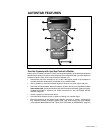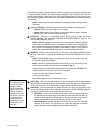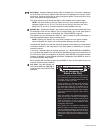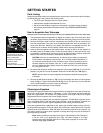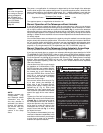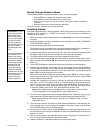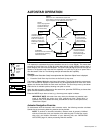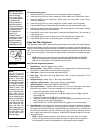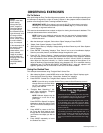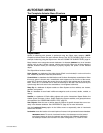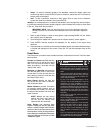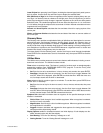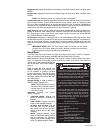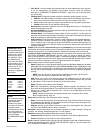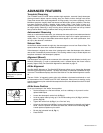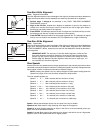
Go To Saturn
After performing the Easy Two-Star Alignment procedure, the motor drive begins operating and
the telescope is aligned for a night of viewing. Objects in the eyepiece should maintain their
position even though the Earth is rotating beneath the stars.
IMPORTANT NOTE: Once aligned, only use the GO TO or Arrow keys to move the
telescope. Do not loosen the telescope locks (
6 and 9, Fig. 1), or move the base
manually, or alignment will be lost.
This exercise demonstrates how to select an object for viewing from Autostar’s database. This
example demonstrates how to select Saturn.
NOTE: Saturn is not visible the entire year and you may need to choose another
object from Autostar's database; however, the procedure, as described below,
remains the same.
1 After the telescope is aligned, “Select Item: Object” displays. Press ENTER.
2. “Object: Solar System” displays. Press ENTER.
3. “Solar System: Mercury” displays. Keep pressing the Scroll Down key until “Solar System:
Saturn” displays.
4. Press ENTER. “Calculating” displays. Then “Saturn” and a set of coordinates displays.
Saturn’s (and other planets’) coordinates change throughout the year.
5. Press GO TO. “Saturn: Slewing...” displays and the telescope slews until it finds Saturn.
You may need to use the Arrow keys to center Saturn precisely in the eyepiece. Autostar
then automatically slews (moves) the telescope so that it "tracks" Saturn (or whatever
other object you may have chosen);
i.e., Saturn remains centered in the eyepiece. If an
object is observed in the telescope without using Autostar's GO TO or automatic tracking
capabilities (see "TO TRACK AN OBJECT AUTOMATICALLY
," page 20), objects in the
eyepiece gradually drift out of the field of view due to the Earth's rotation.
Using the Guided Tour
This example demonstrates using “Tonight’s Best” Guided Tour.
1. After observing Saturn, press MODE twice so that “Select Item: Object” displays again.
2. Press the Scroll Down key twice. “Select Item: Guided Tour” displays.
3. Press ENTER. “Guided Tour: Tonight’s Best” displays. Press ENTER.
NOTE: If you wish to try out other Guided Tours, press the Scroll Down key to scroll
through other tour choices.When
the tour you wish to select dis-
plays, press ENTER.
4. “Tonight’s Best: Searching...” dis-
plays. After calculating, “Tonight’s
Best: Jupiter” displays.
NOTE: Different objects may be
displayed on a tour list on any
given night.
Press ENTER or Speed/? to display
information about the object. Press
GO TO to move the telescope to the
object.
5. Press MODE to return to the Tour
list. Press the Scroll keys to scroll
through the list. Press ENTER when
you find the next object you wish to
observe.
6. Press MODE repeatedly to leave
the Guided Tour menu.
OBSERVING EXERCISES
TIPS
FOR BEGINNERS
Which One’s the Alignment
Star?
If Autostar has chosen an alignment star with which
you are unfamiliar, how can you be sure if the star
in your eyepiece is really the alignment star?
The rule of thumb is that an alignment star is usual-
ly the brightest star in that area of the sky. When
you view an alignment star in an eyepiece, it stands
out dramatically from the rest of the stars in that
portion of the sky.
If you have an obstruction, such as a tree or a build-
ing blocking your view of the alignment star, or if
you have any doubts at all about the star that has
been chosen, no problem. Just press the Scroll
Down key and Autostar will find another star to align
upon.
NOTE:
Keep in mind that
when viewing
through the eye-
piece, images of
terrestrial objects
are right-side-up,
but reversed left-for-
right. Normally, such
an image orienta-
tion is not bother-
some, unless trying
to read a distant
sign, for example.
If the telescope is to
be used for exten-
sive terrestrial
observations, a cor-
rectly oriented
image is provided
with the #933 45°
Erecting Prism. See
“OPTIONAL
ACCESSORIES,”
page 25.
Observing Exercises 15



